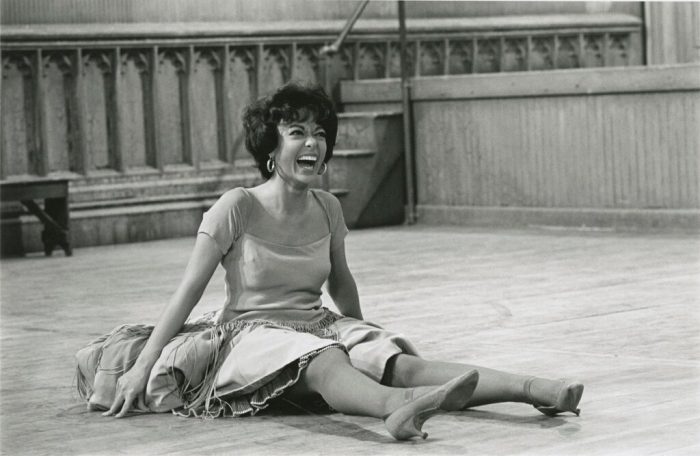Movie Review: Rita Moreno documentary celebrates her fame and humanity
Reviewed by Jeffrey Sanzel
At age 89, Rita Moreno has shown no signs of slowing down. The actor-singer-dancer’s seventy-plus year career spans from Hollywood to Broadway to London’s West End, from clubs to television to regional theatre. The documentary Rita Moreno: Just a Girl Who Decided to Go for It is a fascinating glimpse of this iconic figure.

Photo courtesy of MGM/Roadside Attractions
The film, made around the time of Moreno’s eighty-seventh birthday, is a revelatory exploration. Moreno is candid, whether speaking of the highlights of her career or her personal demons. She is one of the most award-winning performers, including that rare EGOT — Emmy, Grammy, Oscar, and Tony. (Only fifteen people have achieved this honor.) Moreno also has a star on the Hollywood Walk of Fame, has received a Screen Actor’s Guild Life Achievement Award, and was presented with a National Arts Medal by President Barack Obama.
But in all her fame, the documentary shows a warm, humorous, down-to-earth individual who has never let discrimination or gender inequality from stopping her. She faced some of the worst mistreatments common to young women in Hollywood. She braved setbacks and disappointments as well as violence. Moments of self-doubt have plagued her for seven decades. And yet, in all of this, she maintains a remarkable and inspiring sense of self.
Born December 11, 1931, in Humacao, Puerto Rico, Rosa Dolores Alverío Marcano was brought to the United States by her divorced mother when she was only six years old. (She never saw her brother again.) While barely into her teens, she began performing in New York City before a talent scout brought her out to Hollywood, where she began a film career that would span well over half a century.
Landing a contract with MGM, Moreno was given the look of a Latina Elizabeth Taylor. Subsequently, her roles consisted of playing “ethnics,” often with darkened skin and thick accents. One exception — and an experience that she clearly prizes — was playing Zelda Zanders in the Golden Age musical Singin’ in the Rain. Here, she was allowed to eschew the stereotype that had been and would continue to dominate most of her career.
She achieved cinematic immortality (and an Oscar) for her portrayal of Anita in West Side Story. She expresses deep gratitude for the opportunity to play what she saw as an empowering role. She hoped that it would lead to more varied roles, but the offers that followed were much the same type — gang-related films and the like.
Moreno continued to work on stage and in film and television, garnering praise and accolades. For many, she is the “Hey, you guys!” cast member of the PBS children’s show The Electric Company. The show ran from 1971 to 1977 and led to her Grammy Award.
The 1990s saw her as Sister Peter Marie Reimondo on the prison series Oz, something she credits with bringing her back into the public eye. Most recently, she featured as the grandmother in the short-lived reboot of One Day at Time. In addition, Stephen Spielberg created a role for her in the remake of West Side Story, due out on Dec. 11.

Moreno shares openly about her personal life. Her Hollywood agent raped her; to her horror, she continued to use him as her agent. She speaks of her emotionally abusive seven-year on-again-off-again relationship with Marlon Brando, by whom she became pregnant. (Brando insisted she have an abortion.) Her heartbreak over the actor led to a suicide attempt.
Equally as revealing is the frank discussion of her marriage. In 1965, she wed cardiologist Leonard Gordon, to whom she remained married until he died in 2010. To the world, they were the perfect couple. However, she admits that she was never truly happy with him and wished she had left him. Nevertheless, she remains close with their one daughter, Fernanda Gordon Fisher, and her two grandsons.
Throughout the film, her colleagues give insight into her success. Morgan Freeman (with whom she appeared on The Electric Company), producer-director Norman Lear, playwright Terrence McNally (for whom he wrote her Tony-Award winning role in The Ritz), her West Side Story co-star George Chakiris, fellow EGOT-winner Whoopi Goldberg, and one of the film’s executive producers, Lin-Manuel Miranda, marvel at her talent and tenacity. Film historians chime in with commentary about how she managed to rise above what were often dimensionless roles.
The film emphasizes Moreno as a social trailblazer, including her involvement in fighting racism and sexism. She is shown with Sammy Davis, Jr. at Dr. Martin Luther King Jr.’s famous “I Have a Dream” speech in August 1963. She continues with her social activist work to this day.
Director Mariem Pérez Riera has constructed an elegant and eloquent film that celebrates not just Moreno’s fame but, more importantly, her humanity. The story is of a life both rich and challenging and one that led to the fullest. Any biography is a “version” of the subject. Riera presents Moreno in the strongest and most positive light. But there is something so completely present and unpretentious about the dynamic Moreno that one would be hard-pressed to doubt her sincerity.
Moreno’s recent remarks defending Lin-Manuel Miranda and the casting of In the Heights overshadowed the film’s release. Shortly after, she walked them back, but the controversy still hovers. It would be sad if this affected the documentary’s success. Rita Moreno: Just a Girl Who Decided to Go for It is an honest look at an important figure: a survivor, a role model, an exceptional talent, and a vibrant and valued human being.
In her own words, “You always have to be able to get up, dust yourself off, and move forward.” Hopefully, viewers will keep this in mind and embrace this incredible portrait. Rated PG-13, the documentary is now playing at local theaters.







